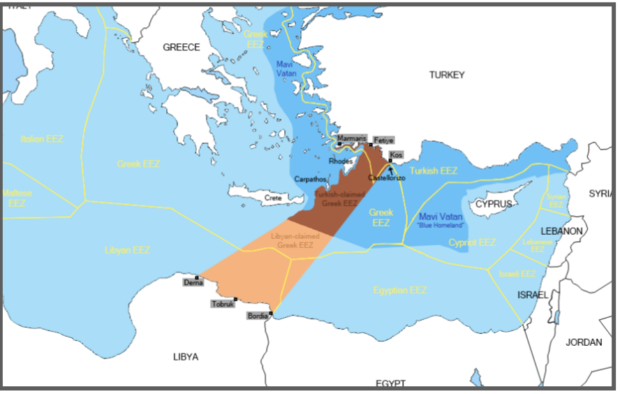Turkey’s Libya Gamble

by Endy Zemenides
On November 27, 2019, Turkey closed out a year during which it moved significantly towards “rogue state” status by signing an agreement with Libya purporting to declare new maritime boundaries, despite the fact there can be no maritime boundaries between the two nations, and purposefully ignoring the maritime zones of Greece, Cyprus, and Egypt.
This “deal” also included a security and military cooperation agreement. In fact, in the deal, Turkey is laying claim to maritime boundaries clearly within the purview of Greece, Cyprus, and Egypt. As you can see from the map below, islands in the Greek Dodecanese island chain, the island of Crete and Egypt’s exclusive economic zone are located in between Turkey and Libya, preventing any maritime boundary between the two.
Turkey’s attempt to cut across boundaries clearly belonging to Greece, Egypt, and Cyprus under international law is its latest attempt to infringe on the sovereignty of Greece and Cyprus and to further destabilize the Aegean and the whole Eastern Mediterranean region. Turkey is also clearly taking advantage of the conflict in Libya and using its leverage over the Libyan government to promote its expansionist claims, which further destabilizes the region by disrupting Libya’s relations with its neighbors. In addition, the deal — which includes a security and military cooperation agreement — likely violates the U.N. embargo against Libya (an embargo Turkey has already been accused of repeatedly violating).
The area claimed by Turkey overlaps with the part of the sea that is needed for the East Med Pipeline – which Greece, Cyprus and Israel just recently signed an agreement over. The East Med Pipeline aims to create a new regional energy hub which will lessen Europe’s dependence on Russian natural gas.

Turkey’s deal with Libya is the latest in a series of provocations meant to completely destabilize the region. It follows in the footsteps of its continued illegal exploration of Cyprus’s exclusive economic zone and its continued belligerence against Greece and its near-daily infringements of Greek airspace. The deal also comes against the backdrop of recent high-profile claims against Greek and Cyprus sovereignty. In a letter to the U.N. on November 13, 2019, Turkey’s Permanent Representative to the U.N. Feridun Sinirlioglu presented Ankara’s idea of a “Blue Homeland,” “stress[ing] Ankara’s right to have maritime zones and a continental shelf west of the 28th meridian (located south of Rhodes), ignoring the Dodecanese island chain in the southeast Aegean and Crete.” Meanwhile, Turkish diplomat Cagatay Erciyes, who is the Turkish Foreign Ministry’s Director for border issues, took to Twitter recently to post a map of Turkey laying claim to a large swath of the Eastern Mediterranean.
Reaction from Greece, Cyprus, and Egypt was swift. All have decried the Libyan-Turkish deal as contrary to international law on several fronts. The US State Department followed, decrying Turkey’s move as “unhelpful and provocative,” noting that “[t]hese developments highlight the risk of the Libyan conflict taking on wider regional dimensions and the urgent need for all interested parties to work toward a negotiated solution.”
There are a few traditional cheerleaders of Turkey – Soner Cagaptay and George Friedman – who have portrayed this deal as a great power move by Ankara. A more accurate assessment of Turkey’s behavior in the Eastern Mediterranean is that it has transitioned from a diplomatically deft actor to a diplomatically dumb and dangerous one.
The Eastern Mediterranean is coming together as a political and economic region. The established of the Eastern Mediterranean Gas Forum – which includes Cyprus, Egypt, Greece, Israel, Italy, Jordan and the Palestinians – laid the foundations for further integration and cooperation. Instead of playing a constructive role in a region that is coming together, Turkey is trying to scuttle any consensus and write its own rules. Ankara seems to think the Eastern Mediterranean is its terrain and wants to play the role the US did in the Caribbean or assert itself like China does in the South China Sea.
Erdogan appears to be creating as many flashpoints as possible in order to force regional actors to deal with Turkey on his preferred terms. But he spent 2019 overplaying his hand – his miscalculation over US reactions to his S400 deal with Russia should be recalled – and he may be once again underestimating the downside of his latest machinations.
Time seems to be running out for Turkey’s allies in Libya. A Turkish troop deployment to Libya is not a matter of consensus in Turkey – where the opposition voted against it – or in Libya, where the Libyan parliament – which is in conflict with the internationally recognized government which Turkey struck its “deal” with – voted against Turkish involvement in their country. Logistically, a significant Turkish troop deployment to Libya is not an easy matter.
Erdogan is taking significant political and military risks. Greece, Cyprus, Egypt, Israel, Italy, France and even the United States will all react in some manner, and those reactions will most definitely weaken Erdogan’s hands. Can Turkey assume both the Herculean task of propping up its ally in Libya – while Russia, UAE and Egypt support the other side – AND risk naval confrontation with Greece and Egypt or a diplomatic showdown with the EU?
Turkey has already gone from a “zero problems with neighbors” foreign policy to a “problems with every neighbor” policy. Now it wants problems on borders it doesn’t even have.











0 comments